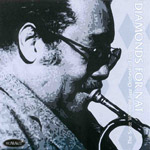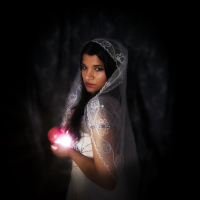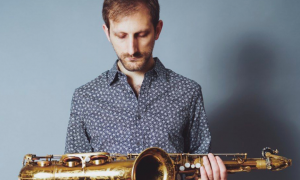Home » Jazz Articles » Interview » Chicago Underground Duo: Two Voices, One Sound
Chicago Underground Duo: Two Voices, One Sound
RM: Well, I consider Chad my spiritual brother. Even beyond blood. I think because of that feeling, we're able to do things that are sometimes kind of extraordinary, and I don't necessarily even mean the music—it could be a conversation or a look. Not to mention what, of course, everybody knows: he's an incredible drummer with an incredible subtlety to his playing and a great layering or rhythms that don't sound complex but are. And he has the aura about him, and the light within him, to not try too hard—not not try too hard to let people know what your intention is. It could mean playing fast, or even the way you walk or what you order for dinner.
That's what I find really excellent about him and that's why we continue this relationship even though we hardly see each other anymore—and we're not on the phone with each other every other day, either. I don't think I've talked to Chad in a month. But it doesn't matter, because, without sounding too stupid, our relationship transcends that.
CT: I think we ended up making a very good pair because Rob has no fear, which is something that I've always respected—but [laughing] can be very dangerous. He's always the one who will push things to the limit just to see what will happen, and I have, I think, a much more conservative approach. So together, we sort of balance one another out. He's an amazing musician to work with; he just has so many different ideas and he puts so much into every musical moment when he's performing, which is very special. The other thing is that he also really thinks about music as sound—I know he thinks about himself that way. That's quite unusual for musicians to have that approach.
AAJ: Let me ask about some of the other people who have played as members of the different Chicago Underground configurations. When you're the Trio, the additional member is Noel Kupersmith on bass and laptop. How's it a different group with him added?
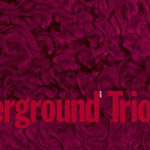 CT: Well, it's different personalities—so it's completely different because we all have such strong personalities that if you throw one personality into the mix, it's a completely different band. That goes for the Quartet, too. Actually, Noel is no longer with the Underground. The new bassist for the trio is Jason Ajemian. He worked with [Ken] Vandermark; actually, he still might still be in some Vandermark band or other.
CT: Well, it's different personalities—so it's completely different because we all have such strong personalities that if you throw one personality into the mix, it's a completely different band. That goes for the Quartet, too. Actually, Noel is no longer with the Underground. The new bassist for the trio is Jason Ajemian. He worked with [Ken] Vandermark; actually, he still might still be in some Vandermark band or other.
RM: And we did some shows as a quartet with Matthew Lux, an electric bass player who used to play in Isotope 217; we've done a lot of stuff together. We did some shows in Europe with that configuration, which was really great—really nice time.
AAJ: Well, then, what about [guitarist] Jeff Parker? Is he still technically a member of the Quartet?
CT: That's a very interesting question. I would hope so. You'd need to ask Jeff that. I'm actually working with him in a couple of weeks for the first tour under his name—I think it's a mostly-European tour—and we're doing a lot of his music, but I wouldn't be surprised if we even did some Underground tunes even though the tour's under his name. But I would hope that we get to work again in the Chicago Underground because that adds a whole other element to the music.
RM: He actually quit the group, but I have a new group called Exploding Star Orchestra, which is a large group, and he's in that. But he quit Chicago Underground a while ago; I can't say definitely whether he'd want to do something in the future with the group. He quit, so it's up to him—well, it's up to him, me and Chad.
Jeff is one of the most amazing musicians I've ever heard; I love his playing—probably too much. Whatever he feels he needs to do in his trajectory, being a human, I'm certainly here to support, whether it's playing with me or not. Luckily, I'm still playing with him in the larger group.
AAJ: Okay, this record's done. Do you plan to do any Chicago Underground gigs this year?
CT: Yeah. We really need to tour the States. We haven't done that in a really long time, and that's been mostly because we've become so spoiled going to Europe. When we've played the States, we've never played the jazz festivals or jazz clubs; we've always played the rock circuit—which is great because your audience is a lot younger and a lot of times they're hearing improvised music for the first time. So that's a great experience, although the money and the venues often aren't that good. So hopefully, we're going to do some of that soon. I think we're planning to tour Europe in September, but we're making plans to do the States.
AAJ: I don't suppose there's any plan for a Chicago Underground Trio or Quartet recording for the near future.
RM: No, no, there is. We were going to record a Trio record a couple months ago in Chicago, for Delmark, but it just couldn't happen at the last minute due to schedules. But we've been talking about a Trio record and a Quartet record; we have ideas for it because of the touring we did and also from the playing we did with Jason Ajemian. So it's just a matter of timing. Those two projects are certainly in the back of our heads somewhere.
AAJ [to RM]: Tell me about Exploding Star Orchestra. I had the good luck to see the band in Chicago last August at Millenium Park.
RM: Well, Michael Orlove [of the Chicago Department of Cultural Affairs] approached me about having a large ensemble representing the more contemporary side of things in Chicago for the series [Made in Chicago] he was doing there—you know, you probably saw the flyer: one night was bebop, one night was vocal. He wanted me to handle the night of contemporary, because he liked what I did in Isotope 217 and the Chicago Underground. I think he wanted it to come more from that angle. I'd been thinking about doing a large ensemble for a long time. He said, "think as big as you want, the budget will be pretty good and you'll be able to really do something nice.
So I put together a list of players. I decided to use some musicians that I had worked with, some musicians that I'd never played with who I admired very much, and others who I had known and heard a lot and also admire. I'd been thinking about writing for larger ensembles, so I had stuff that I had written and had had on paper for years, and some new stuff—plus I was given a residency at L'Abbaye Royale de Fontevraud in France and this grant residency was to do a multimedia piece based on the atmosphere of the Abbaye, which was built in 1101. I spent three months there composing, filming, photographing, painting, and also coming up with texts.
So through this, I started composing these piano pieces that I was going to electronically morph to make these atmospheres for the abbey; I was going to have these morphed piano things to go with these paintings: I made eight big watercolors based on the human body, transcending the human body. So anyway, these piano pieces that I wrote—which were never intended to be made into actual piano pieces—actually turned out to be a means to yet another thing in that three of the songs you heard that night were originally piano compositions from that time I spent writing at the Abbaye.
And there's a story line to the whole two suites that I played that has to do with a sting ray who meets certain things in the ocean and eventually works its way into the Amazon Basin and what they call the Meeting of the Waters here in Manaus, where the Black River and the White River meet. It's almost like a children's story. A lot of things happen, but the first half of the suite has to do with the ocean and the second half has to do with the sky.
Anyway, that's Exploding Star Orchestra. And when you're talking about a fish as ancient as a stingray, you're talking about a very old thing, and I think the group is trying to embody a concept of the actual beginning of time and end of time—how sound can fit into that area as done by thirteen or fourteen musicians of varying backgrounds. Because between John McEntire and some of the guys from Tortoise and people like Nikki Mitchell and Dave Boykin, who's from the South Side—people ask me that a lot, about the segregation in Chicago. I really don't think in those terms. I just think in terms of, well, people can invite people to do things if they want. If you want to use somebody who's on the South Side, then give them a call! If you're talking about politics or how money is given out in the city, that's a whole other issue.
The recording from the live show at Millennium Park is really excellent. I was thinking about releasing it, but there are parts of it that are fairly rough. I don't mind—and the energy of it was amazing, so at some point I think that will be released. But we are recording the music for Thrill Jockey in June so it should be out in late fall, or early 2007.
 AAJ [to CT]: I really like the Spiritual Unity project that you did with Marc Ribot, Henry Grimes and Roy Campbell. You did the album of the same name last year, and the band's still performing and exploring the Albert Ayler legacy. Any observations on your experiences with this group?
AAJ [to CT]: I really like the Spiritual Unity project that you did with Marc Ribot, Henry Grimes and Roy Campbell. You did the album of the same name last year, and the band's still performing and exploring the Albert Ayler legacy. Any observations on your experiences with this group?
CT: The one thing I want to say about it is that when the band plays regularly, it really changes. I mean, with any band it's like that—the more you play, the better it sounds. When we did that record for Pi, that was the very beginning of the band. So by the time we finished touring, the band sounded incredible; it was a completely different band. I think it's unfortunate that we didn't record after the tour, because the music came such a long way. We have another tour in the fall, and hopefully we can record something after.
AAJ [to CT]: So as a relatively new New Yorker, you're in the relatively unique position of having been played with the improvising musicians in Chicago—people like Nicole Mitchell and David Boykin, just to name two—and now with New York players. Is there any contrast between the two situations?
CT: There's no easy way to answer that question, but I think that yeah, there is a difference. Things are always changing in Chicago, so I don't really know what's going on there now. One thing I do remember from when I was there was that the way that you lived as a musician was much different from the way that you live in New York. It was a lot easier in a lot of ways to be a musician; I was able to support myself pretty comfortably just playing music. I also wasn't really worried about what people thought about what I was doing—I just did the things I did because I enjoyed playing with my friends and it was just strange that a lot of that stuff that I was doing became somewhat successful.
But in New York, just because it's just so hard just to be a musician because there are so many great musicians here, obviously—oh, man, I wish you hadn't asked me this question—I find that it's just a different mentality. Now, the thing about Chicago that was bad was that although I was doing a lot of different sorts of music, I found myself getting a little bit lazy because I didn't have to bust my ass 24/7 like sometimes you have to do in New York.
AAJ: Just to keep the gigs coming?
CT: Yeah, just to keep the gigs coming. But you were able to be in an environment where you could create your own thing. Not that you can't do that in New York. It's just a different thing.
AAJ: What are you doing this year?
CT: I've got a couple new bands. There's a new band I'm doing with Cooper-Moore and [saxophonist] Assif Tsahar that I'm really excited about. I have a couple recording dates coming up—one is something Steve Swell's doing, but it's working with [percussionist] Warren Smith. I'm really excited about that; he's a legend. Sticks and Stones [Taylor's seminal Chicago band with bassist Josh Abrams and altoist Matana Roberts] are doing a tour in a couple months, and I'm hoping we can record, because that's a great band that needs to keep on working. So hopefully that'll happen soon.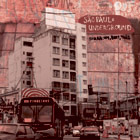 RM: I have another group called Sao Paulo Underground; it's a new group I started with a drummer in Sao Paulo called Mauricio Takara. His family owns a studio in Sao Paulo. The Chicago Underground Duo did a tour of Brazil last year and after, I stayed in Sao Paulo for a few days and played with Mauricio and it was such a great experience that we thought, hey, we should do something with this. Not only is he a great drummer, but he's a great computer programmer, which I really wanted to pull into various projects, because I can only do so much on the computer.
RM: I have another group called Sao Paulo Underground; it's a new group I started with a drummer in Sao Paulo called Mauricio Takara. His family owns a studio in Sao Paulo. The Chicago Underground Duo did a tour of Brazil last year and after, I stayed in Sao Paulo for a few days and played with Mauricio and it was such a great experience that we thought, hey, we should do something with this. Not only is he a great drummer, but he's a great computer programmer, which I really wanted to pull into various projects, because I can only do so much on the computer.
So we ended up recording our first record, which is going to be released in May on Aesthetics Records—the same label that did the Mandarin Movie record. So we're going to do a tour of Poland, and some shows with Mandarin Movie and some festivals in Australia and then a tour in Brazil. I think Chicago Underground Duo will do some touring in September and October.
Selected Discography
Chicago Underground
Chicago Underground Duo, In Praise of Shadows (Thrill Jockey, 2006)
Chicago Underground Trio, Slon (Thrill Jockey, 2004)
Chicago Underground Duo, Axis & Alignment (Thrill Jockey, 2002)
Chicago Underground Quartet, Chicago Underground Quartet (Thrill Jockey, 2001)
Chicago Underground Duo, Synesthesia (Thrill Jockey, 2000)
Chicago Underground Trio, Flamethrower (Delmark, 2000)
Chicago Underground Trio, Possible Cube (Delmark, 1999)
Chicago Underground Duo, Twelve Degrees of Freedom (Thrill Jockey, 1998)
Chicago Underground Orchestra, Playground (Delmark, 1998)
Rob Mazurek
Mandarin Movie, Mandarin Movie (Aesthetics, 2005)
Rob Mazurek, Music for Shattered Light and 7 Posters (Bottrop-Boy, 2005)
Rob Mazurek, Sweet and Vicious Like Frankenstein (Mego, 2004)
Rob Mazurek, Silver Spines (Delmark, 2002)
Isotope 217, Who Stole the I Walkman? (Thrill Jockey, 2000)
Isotope 217, Utonian Automatic (Thrill Jockey, 1999)
Robert Mazurek, Playground (Delmark, 1998)
Chad Taylor
Marc Ribot, Spiritual Unity (Pi Recordings, 2005)
Jeff Parker, The Relatives (Thrill Jockey, 2005)
Triptych Myth, The Beautiful (AUM Fidelity, 2005)
Sticks and Stones, Shed Grace (Thrill Jockey, 2004)
Cooper-Moore/Tom Abbs/Chad Taylor, Triptych Myth (Hopscotch, 2004)
Sticks and Stones, Sticks and Stones (482 Music, 2002)
Visit the Chicago Underground Duo and Rob Mazurek on the web.
Photo Credit
Josh Wildman
Tags
About Chicago Underground Duo
Instrument: Band / ensemble / orchestra
PREVIOUS / NEXT
Support All About Jazz
 All About Jazz has been a pillar of jazz since 1995, championing it as an art form and, more importantly, supporting the musicians who make it. Our enduring commitment has made "AAJ" one of the most culturally important websites of its kind, read by hundreds of thousands of fans, musicians and industry figures every month.
All About Jazz has been a pillar of jazz since 1995, championing it as an art form and, more importantly, supporting the musicians who make it. Our enduring commitment has made "AAJ" one of the most culturally important websites of its kind, read by hundreds of thousands of fans, musicians and industry figures every month.



